By Sapna Maheshwari
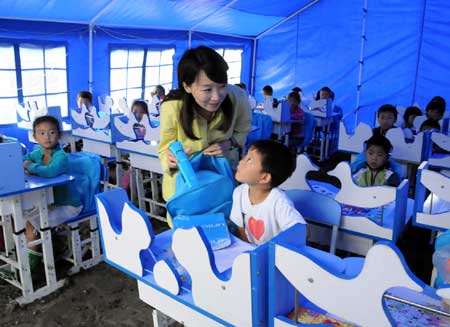 Dr. Chan distributes UNICEF school kits at a tent school on June 30. (Photo by K.Shindo?UNICEF)
Dr. Chan distributes UNICEF school kits at a tent school on June 30. (Photo by K.Shindo?UNICEF)
Japan's national UNICEF committee ambassador presented $1 million (USD) for earthquake relief funds to UNICEF's China office at a press conference Thursday afternoon and stated the goal of raising an additional $3 million in coming months.
The ambassador, Dr. Agnes Chan Miling, recently completed a weeklong visit to the Sichuan earthquake zone on July 2, during which she observed UNICEF field projects, entertained children and distributed UNICEF school kits, plus other volunteer work.
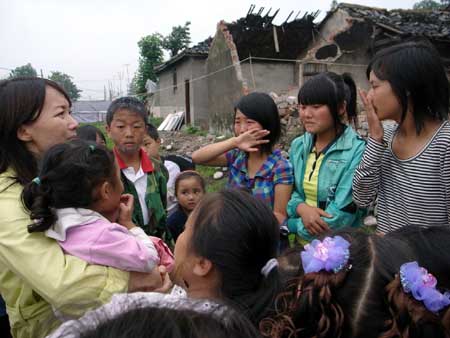 Children cry after performing an original story for Dr. Chan based on their personal experiences from the earthquake on June 30. (Photo by K.Shindo?UNICEF)"
Children cry after performing an original story for Dr. Chan based on their personal experiences from the earthquake on June 30. (Photo by K.Shindo?UNICEF)"
"I think that after the earthquake, the relationship between China and Japan has greatly improved," Dr. Chan said. "Many Japanese people are concerned about the earthquake [because] Japan is a country where a lot of earthquakes happen."
A team from NHK (Japan Broadcasting Corporation) followed Dr. Chan and will produce a documentary about the experience to help with fundraising efforts in Japan.
"The purpose of coming back was to visit the situation and return to raise awareness with a firsthand experience," she explained.
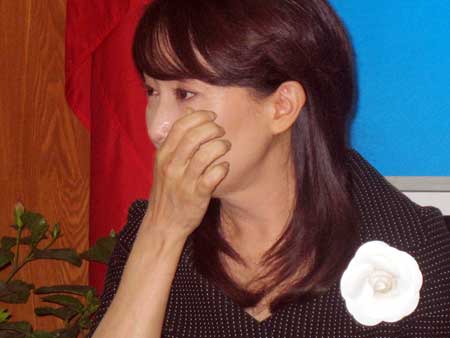 Dr. Chan wipes away tears while recounting a story about a 9 year-old girl who lost her mother in the earthquake. She and the girl sang a song together.
Dr. Chan wipes away tears while recounting a story about a 9 year-old girl who lost her mother in the earthquake. She and the girl sang a song together.
She said she believes Japan's experience with earthquakes can help China.
"We should teach people how to respond, how to protect themselves," she said. "In Japan every year, we do exercises on the national and local level, and schools also organize exercises, in terms of earthquake response. When the earthquake happens, we teach children where to go, how to protect themselves and where they should go to wait for their parents."
Dr. Chan, a Hong Kong native, was appointed to her position in 1998 and has traveled to a number of countries to monitor UNICEF field projects, including Sudan, East and West Timor, Cambodia and India. She was a pop idol in Japan during the 1970s and continues to use music in her charity work.
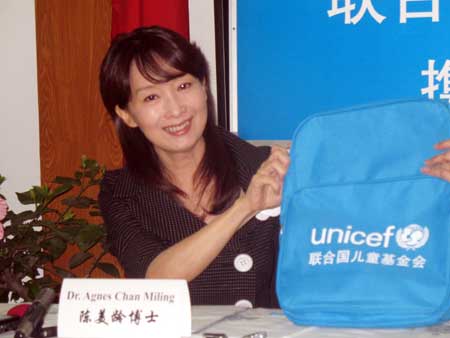 Dr. Chan displays one of the UNICEF school kits distributed to children affected by the earthquake.
Dr. Chan displays one of the UNICEF school kits distributed to children affected by the earthquake.
Dr. Chan holds a degree in developmental psychology from the University of Toronto and a doctorate in education from Stanford University.
Sichuan was the first earthquake zone she ever visited and she was struck by the courage of the children she met.
"I think each of them impressed me," Dr. Chan said. "I think many children can recover quickly and go back to their normal life, but there are still 5 percent or 3 percent of affected children who need special care and support."
"In order to help them recover, we need to do a lot," she said. "Some of them have lost their families and we must show them that there are people who care for them and will take care of them."
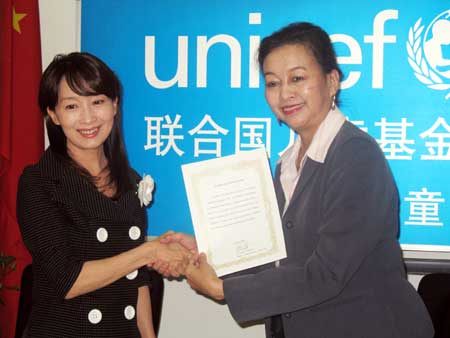 Nwe accepts the Japanese UNICEF donation with gratitude.
Nwe accepts the Japanese UNICEF donation with gratitude.
China's national UNICEF representative, Dr. Yin Yin Nwe, said UNICEF has delivered $9 million in earthquake relief so far, which was donated from people around the world as well as Chinese businesses.
Most of the money was spent on health items, like medical kits and water purification items, and tents for housing and temporary schools. A full list of supply distribution can be found at: http://www.unicef.org/china/unicef_supply_update_1_July_ENG.pdf.
"We didn't have to exert ourselves too much to raise relief money for this disaster," she said.
UNICEF, which stands for the United Nations Children's Fund, is the largest agency on the ground in Sichuan, Nwe said.
She added that UNICEF was the first United Nations agency to go to Sichuan on the ground and one of the first of all international organizations.
UNICEF has pledged to contribute a total of at least $30 million in support up to 2010 for the Sichuan earthquake victims.
(China.org.cn July 3, 2008)